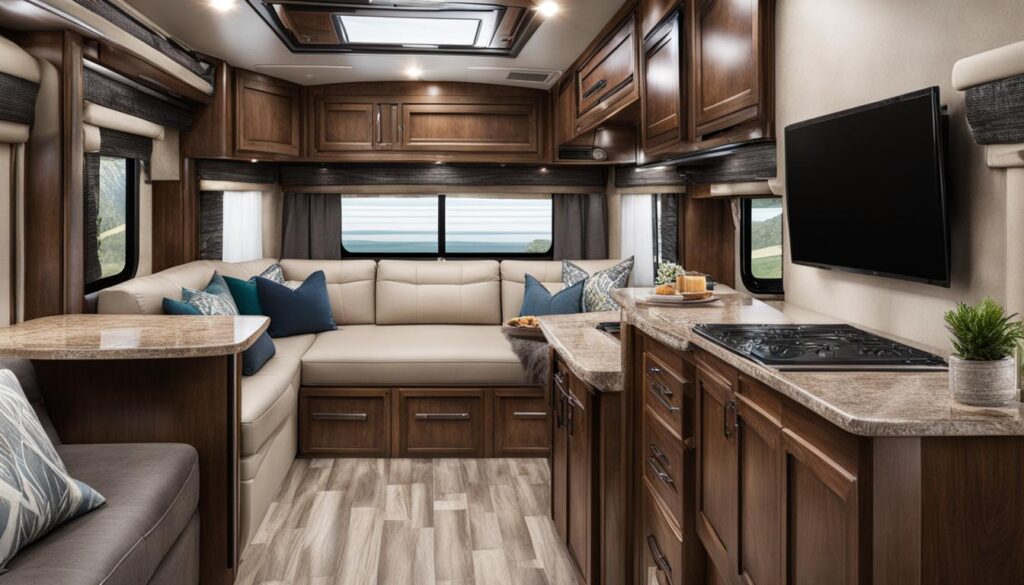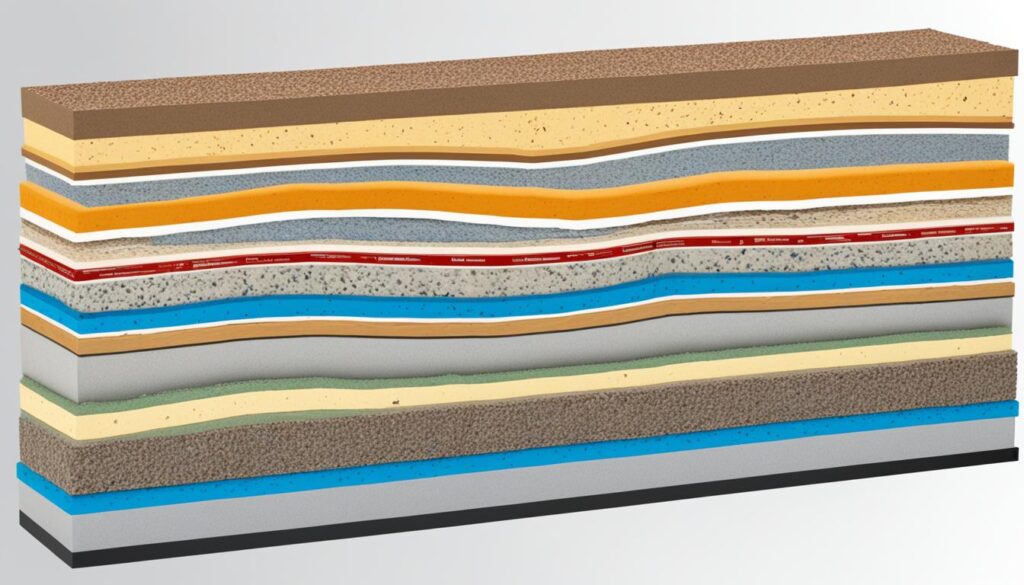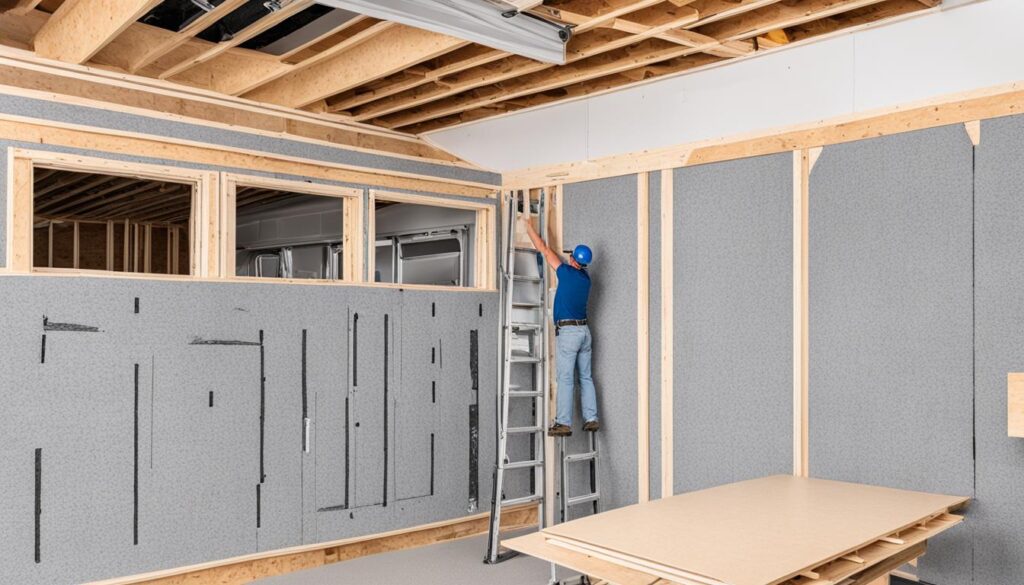Have you ever wondered how thick the walls of your RV are? Are they thick enough to provide the necessary insulation and durability? Understanding RV wall thickness is crucial for every RV owner, as it directly impacts the comfort and safety of your travels. But how thick are RV walls really?
RV wall thickness can vary depending on a variety of factors, including the type of construction materials used and the desired level of insulation. In this comprehensive guide, I will break down the different factors that influence RV wall thickness, common ranges of wall thicknesses, and why it is important to consider when choosing or modifying an RV.
Key Takeaways:
- RV wall thickness varies based on factors such as construction materials and insulation requirements.
- Common wall thickness ranges from 1.5 to 2 inches for exterior walls and 1 inch for interior walls.
- Wall thickness impacts structural integrity, insulation properties, weight distribution, and overall performance of an RV.
- Upgrades and modifications can be made to enhance insulation, soundproofing, or durability of RV walls.
- Understanding RV wall thickness helps in making informed decisions for a comfortable and safe RV experience.
Contents
Factors Affecting RV Wall Thickness
When it comes to RV wall thickness, several factors come into play. The type of construction materials used is one of the main influencers. RV walls are typically constructed using a combination of aluminum, fiberglass, wood, and foam insulation. These materials vary in thickness, with aluminum and fiberglass being the thinnest, while foam insulation provides additional thickness for insulation purposes.
Other factors that can affect RV wall thickness include the desired level of insulation, structural integrity, weight considerations, and manufacturing standards. The level of insulation required will determine the thickness of the walls to ensure optimal temperature regulation inside the RV. Structural integrity is essential to ensure the durability and stability of the vehicle, while weight considerations can impact towing capacity and fuel efficiency. Moreover, adhering to manufacturing standards guarantees that the RV meets safety and quality requirements.
In summary, the factors affecting RV wall thickness encompass the choice of construction materials, insulation needs, structural considerations, weight management, and adherence to industry standards. By understanding these factors, RV owners can make informed decisions regarding their RV wall construction, ensuring a comfortable and safe travel experience.

“The type of construction materials and desired insulation level are key factors in determining RV wall thickness.”
Common RV Wall Thicknesses
When it comes to RV wall construction, understanding the common thicknesses is essential. While the specific measurements can vary depending on the manufacturer and model of the RV, there are some general ranges to consider.
Generally, the exterior walls of an RV have a thickness of around 1.5 to 2 inches. This measurement includes the outer skin, insulation, and interior paneling. The exterior walls are designed to provide protection from the elements and maintain the structural integrity of the RV.
On the other hand, the interior walls of an RV are typically thinner, with a thickness of around 1 inch. These walls serve the purpose of separating the different living spaces within the RV and providing privacy for occupants.
It is important to note that these measurements are approximate and can vary based on the specific design and construction of the RV. Factors such as the type of construction materials used and the desired level of insulation can influence the thickness of the walls.
In the table below, you can find a summary of common RV wall thicknesses:
| RV Wall | Approximate Thickness |
|---|---|
| Exterior Walls | 1.5 to 2 inches (including outer skin, insulation, and interior paneling) |
| Interior Walls | Around 1 inch |
Remember that these measurements can vary, and it is always best to consult the manufacturer or refer to the specific model’s documentation for precise information on wall thickness.
Factors Influencing RV Wall Thickness
The thickness of RV walls is determined by a variety of factors. The design and construction materials used are key considerations. RVs are typically constructed using a combination of aluminum, fiberglass, wood, and foam insulation.
Aluminum and fiberglass are among the thinnest materials used in RV construction, while foam insulation provides additional thickness for insulation purposes. The desired level of insulation, structural integrity requirements, weight considerations, and adherence to manufacturing standards also influence wall thickness.
Having a good understanding of the factors that affect RV wall thickness can help you make informed decisions when choosing or modifying an RV. It’s important to strike a balance between structural integrity, insulation, weight, and other considerations based on your specific requirements.
By knowing the common RV wall thicknesses and considering the factors that influence them, you can ensure that you choose an RV with the appropriate construction and insulation properties for your needs.
Importance of RV Wall Thickness
The thickness of RV walls is crucial for a multitude of reasons. Firstly, it provides structural integrity to the RV, ensuring that it can withstand the vibrations and movements experienced during travel. A well-constructed and properly thickened wall enhances the overall strength and stability of the vehicle, contributing to a safer and more comfortable journey.
In addition to structural integrity, wall thickness significantly impacts the insulation properties of the RV. Adequate thickness helps regulate the temperature inside the vehicle, ensuring a pleasant and comfortable environment for all occupants. Whether you’re traveling in hot or cold climates, having sufficient insulation is essential for maintaining the desired temperature and energy efficiency throughout your journey.

Furthermore, the thickness of RV walls also plays a role in the overall weight distribution and towing capacity of the vehicle. By carefully considering the materials used and the thickness of the walls, RV manufacturers can optimize weight distribution, reducing the risk of imbalances and swaying during travel. This not only enhances the overall stability of the RV but also ensures a smoother and more controlled towing experience.
Overall, understanding and prioritizing the importance of RV wall thickness is crucial for optimizing the structural integrity, insulation properties, weight distribution, and towing performance of your vehicle. By choosing an RV with appropriate wall thickness or considering necessary upgrades, you can ensure a safe, comfortable, and enjoyable journey on the road.
Upgrades and Modifications
As an RV owner, you may be looking to enhance certain aspects of your vehicle, such as insulation, soundproofing, or durability. Fortunately, there are several RV wall upgrades and modifications that can help you achieve your goals. By considering different construction materials, insulation thickness, and paneling options, you can create a customized RV interior that suits your needs.
Adding Extra Insulation
One popular RV wall upgrade is to add extra insulation to enhance temperature control and noise reduction. By increasing the insulation thickness, you can create a more comfortable interior environment and reduce energy consumption. Consult with RV construction professionals to determine the appropriate insulation material and thickness for your specific RV model.
Installing Thicker Panels
If you’re looking to improve the structural integrity and overall durability of your RV walls, consider installing thicker panels. Thicker panels can provide enhanced protection against impacts, weather elements, and general wear and tear. This upgrade can be particularly beneficial for those who frequently travel off-road or in rugged terrains.
Exploring Alternative Construction Materials
Rather than sticking to traditional construction materials, consider exploring alternative options for your RV walls. Some RV owners opt for composite materials or high-density plastics that offer excellent strength and insulation properties. Before making any modifications, seek advice from experts in RV construction to ensure that the materials are suitable for your RV model and comply with industry standards.
| Upgrade/Modification | Benefits |
|---|---|
| Extra Insulation | Improved temperature control and noise reduction. |
| Thicker Panels | Enhanced structural integrity and durability. |
| Alternative Construction Materials | Strength, insulation properties, and customization options. |
Conclusion
In conclusion, understanding RV wall thickness is vital for any RV owner. The thickness of RV walls directly affects the construction, insulation, and overall performance of your recreational vehicle. By recognizing the factors that impact RV wall thickness, such as the choice of construction materials and insulation thickness, you can make well-informed decisions that enhance both your comfort and safety on the road.
Whether you are a seasoned traveler or a first-time RV owner, maintaining an appropriate RV wall thickness is crucial. Not only does it provide structural integrity and durability, but it also contributes to the insulation properties of your RV. This insulation helps to regulate the temperature inside and ensures a comfortable living environment, no matter the weather outside.
If you are considering modifications or upgrades to your RV walls, consult with professionals experienced in RV construction. They can provide valuable guidance and expertise to ensure that any modifications are done safely and in compliance with industry standards. Remember, alterations to RV wall thickness, such as adding extra insulation or using alternative construction materials, can further enhance your RV’s insulation, soundproofing, and durability.
By having a solid understanding of RV wall thickness and its importance, you can make informed decisions about your RV’s construction, insulation, and overall performance. So whether you’re embarking on a cross-country adventure or enjoying a weekend getaway, the proper RV wall thickness will be your reliable companion on the road.
FAQ
How thick are RV walls?
The thickness of RV walls can vary depending on the type and model of the RV, as well as the materials used in its construction. However, a common range for exterior RV wall thickness is around 1.5 to 2 inches, including the outer skin, insulation, and interior paneling. Interior walls may have a thickness of around 1 inch. These measurements are approximate and can vary depending on the specific design and construction of the RV.
What factors affect RV wall thickness?
Several factors can influence RV wall thickness, including the type of construction materials used, the desired level of insulation, structural integrity, weight considerations, and manufacturing standards.
Why is RV wall thickness important?
RV wall thickness is important for various reasons. It provides structural integrity to the RV, ensures insulation properties for temperature regulation and comfort, and impacts the weight and weight distribution of the vehicle, which can affect fuel efficiency and towing capacity.
Can I upgrade or modify my RV walls?
Yes, some RV owners choose to upgrade or modify their RV walls to enhance insulation, soundproofing, or durability. It’s important to consult with professionals or experts in RV construction to ensure any modifications are done safely and in compliance with industry standards.
What materials are used in RV wall construction?
RV walls are typically constructed using a combination of aluminum, fiberglass, wood, and foam insulation. The specific materials and their thickness can vary depending on the manufacturer and model of the RV.
How does RV wall thickness impact RV construction?
RV wall thickness plays a significant role in the construction, insulation, and overall performance of recreational vehicles. Understanding the factors that affect RV wall thickness and maintaining appropriate thickness is essential for ensuring the comfort, safety, and durability of your RV while on the road.






